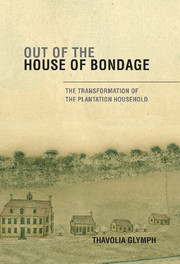Book contents
- Frontmatter
- Contents
- Acknowledgments
- Abbreviations
- Introduction
- 1 The Gender of Violence
- 2 “Beyond the Limits of Decency”
- 3 Making “Better Girls”
- 4 “Nothing but Deception in Them”
- 5 Out of the House of Bondage
- 6 “A Makeshift Kind of Life”
- 7 “Wild Notions of Right and Wrong”
- Epilogue
- Bibliography
- Index
- References
3 - Making “Better Girls”
Mistresses, Slave Women, and the Claims of Domesticity
Published online by Cambridge University Press: 05 June 2012
- Frontmatter
- Contents
- Acknowledgments
- Abbreviations
- Introduction
- 1 The Gender of Violence
- 2 “Beyond the Limits of Decency”
- 3 Making “Better Girls”
- 4 “Nothing but Deception in Them”
- 5 Out of the House of Bondage
- 6 “A Makeshift Kind of Life”
- 7 “Wild Notions of Right and Wrong”
- Epilogue
- Bibliography
- Index
- References
Summary
My house is in order & my handmaidens wait upon me.…
Catherine Edmondston, mistressI will give you a full history of my belief of Darkey, to wit: I believe her disposition as to temper is as bad as any in the whole world. I believe she is as unfaithful as any I have ever been acquainted with.…I have tried and done all I could to get on with her, hoping that she would mend; but I have been disappointed in every instant. I can not hope for the better any longer.
Elisha Cain, overseerHow very domestic I am.
Gertrude Thomas, mistressIn Gone With the Wind, Margaret Mitchell has the fictional Gerald O'Hara understand that a plantation without a proper mistress was but a plantation in the making. O'Hara might accumulate land and slaves enough, but without “a thrifty and kind mistress, a good mother and devoted wife,” Tara would never rise to the status of a great house and his ambitions to join the ranks of the planter elite, never succeed. A mistress meant order and efficiency: clean linen; polished furniture; timely meals; and an end generally to the disorder, sloth, and filth that governed his home without one. But while O'Hara gets this point, Mitchell insists he misses another: That the work of efficiently-run households in fact required the unending attention and oversight of mistresses and the unending attention of slave women to the work on which depended mistresses's ability to fulfill those standards of order and efficiency.
- Type
- Chapter
- Information
- Out of the House of BondageThe Transformation of the Plantation Household, pp. 63 - 96Publisher: Cambridge University PressPrint publication year: 2003



